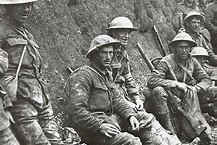
posted 11th June 2023
In June 1914, Europe was sent into political turmoil by one of the most successful and spectacular assassinations in history. Archduke Franz Ferdinand, heir to the throne of Austro-Hungary, was travelling through Sarajevo with his wife, Sophie Duchess of Hohenburg, when a young Bosnian nationalist successfully assassinated the Royal couple. The sad irony of the murder is that there had been an earlier attempt to kill them on the same morning with a grenade thrown at their car. The grenade exploded but hit the car behind theirs injuring the occupants leaving the Archduke and Duchess unharmed. Austro-Hungary was outraged at the murder of the heir to the throne on Bosnian territory and led to the July Crisis where the main European powers, Germany, Austro-Hungary, Britain, France and Russia began an escalation in military and diplomatic activity. Austria-Hungary accused Serbian intelligence of organising Franz Ferdinand’s assassination and demanded concessions from the Serbians. The Austro-Hungarians had no proof that the Serbians had been behind Franz Ferdinand’s killing and Serbia mobilised troops in anticipation of Austro-Hungarian military action. The Serbians had become close allies of the Russian Empire and the Russians ordered the mobilisation of their military in late July 1914. Europe was on the brink of war.
In Germany the military high command, under Kaiser Wilhelm II, needed the support of the German Social Democratic Party for war. To secure this support the German leadership needed to make it appear that the aggressor in the war was Russia and they offered an ultimatum to Russia to cease all war measures against Germany and Austro-Hungary within 12 hours. In reality, the German high command had been preparing for a war in Europe for some considerable time. German Field Marshall Alfred von Schlieffen had developed his plan in the late 19th and early 20th centuries to invade France through Belgium and the Netherlands rather than over the border between the two nations. After quickly defeating France, the Germans then planned to move to the east to engage Russia. The Schlieffen Plan was Germany’s blueprint to use speed and surprise to secure quick victories rather than fighting a prolonged war which they were much more likely to lose.
Tensions between the Germans, Austro-Hungary and Russia were now at fever pitch. The British Cabinet met in late July, 1914, and the decision to uphold the 1839 Treaty of London guaranteeing Belgium neutrality was taken. The 1839 treaty guaranteed Belgium independence and that the British would fight to keep it so. The British had also decided to stand firmly behind France and if there was war between France and Germany then Britain would stand with France. Britain had said that it would remain neutral if France was not attacked and this led to the majority of German forces to go to the eastern front.
On the 1st of August war broke out in Europe with Germany and Russia engaging in the east. On the 3rd of August Germany declared war on France and they decided to violate Belgium neutrality by attacking the country through Belgian territory. This decision to attack France and violate Belgium sovereignty forced the hand of the British who declared war on Germany. The belligerents didn’t understand the level of carnage they were about to unleash onto Europe and onto themselves with the advancement of military technology since the last major war in Europe in the 1870’s. Europe had now descended into two competing factions. On the one side were Britain, France and Russia and on the other, Germany, Austro-Hungary and the Ottoman Empire whose territory covered much of the Middle East.
The British army was sent to Belgium and France to join the Allied war effort against the Axis powers. The first months of the war were spectacularly successful for the Axis powers who pushed the Allies back into a full scale retreat. The trench warfare which WW1 became infamous for was starting to develop by the end of 1914 and millions of the best young men from all over Europe would perish in the trench warfare that developed throughout WW1.
WW1 ended with an Allied victory in November, 1918. The war was technically a victory for the British, but the price paid for fighting it was monumental. The nation lost nearly 900,000 men in the fighting and the process of national decline began. In 1922 the naval treaty was signed between the Allied powers, including the USA who entered the war in 1917, to limit navy development. Britain was the world’s premier naval power, and this further eroded British military strength. The First World War was a tragedy for Britain and a tragedy that could’ve been so easily avoided had the British government decided to opt out of WW1.




